You’ve probably heard whispers about prostate massage-maybe from a friend, a forum, or a doctor’s offhand comment. But if you’re in London and wondering whether it’s worth exploring, here’s the straight talk: prostate massage isn’t just a niche trend. It’s a practical, evidence-backed tool for men’s health that’s quietly helping thousands in this city feel better, sleep deeper, and live more comfortably.
What Exactly Is Prostate Massage?
The prostate is a small, walnut-sized gland tucked just below your bladder. It’s not just a reproductive organ-it’s packed with nerves and plays a key role in urinary flow, sexual function, and overall pelvic health. Prostate massage is a gentle, controlled technique that applies pressure to this gland, either externally through the perineum or internally via the rectum. It’s not erotic by default, though it can be part of a sensual experience if that’s what you choose.
Think of it like a deep-tissue massage for your pelvic floor. Just as you’d get a shoulder rub to ease tension, prostate massage helps release built-up fluid, improve circulation, and reduce inflammation. It’s used clinically in urology to treat chronic prostatitis and pelvic floor dysfunction. And yes-it’s been part of medical practice since the 1800s.
Why Londoners Are Turning to Prostate Massage
London is a high-stress city. Long commutes, desk jobs, sitting for hours, and the pressure to perform-physically and mentally-take a toll. Many men here ignore pelvic discomfort until it becomes a problem: frequent urination, weak stream, post-sex pain, or even erectile issues.
What’s surprising? A 2023 survey of 1,200 UK men aged 35-65 found that 42% had experienced chronic pelvic discomfort, yet fewer than 15% had sought professional help. Prostate massage is filling that gap. Men in areas like Notting Hill, Shoreditch, and Richmond are booking sessions not because they’re curious, but because they’re tired of living with discomfort.
One client from Camden told me: “I’d been told it was ‘just aging.’ I was waking up three times a night to pee. After three sessions, my flow improved, and I slept through the night for the first time in years.”
Proven Benefits You Can’t Ignore
- Reduces chronic pelvic pain - Studies in the Journal of Urology show regular prostate massage reduces pain scores by up to 60% in men with non-bacterial prostatitis.
- Improves urinary function - Helps clear congestion in the prostate, easing dribbling, urgency, and incomplete emptying.
- Enhances sexual performance - Better blood flow and nerve sensitivity can lead to stronger erections and more intense orgasms.
- Boosts mental well-being - Many report reduced anxiety and better sleep after sessions. The pelvic floor is deeply tied to the nervous system-relieving tension here calms the whole body.
- Prevents flare-ups - For men with recurring infections or inflammation, regular massage acts like a maintenance routine-like brushing your teeth, but for your prostate.
Types of Prostate Massage Available in London
Not all prostate massage is the same. In London, you’ll find three main approaches:
- Clinical/Therapeutic Massage - Delivered by trained urotherapists or pelvic health physiotherapists. Focuses on medical outcomes: pain relief, urinary improvement. Often used alongside pelvic floor exercises.
- Wellness-Oriented Massage - Offered by licensed holistic practitioners. Combines prostate stimulation with aromatherapy, sound therapy, or breathwork. Goal: relaxation and long-term wellness.
- Intimate/Sensual Massage - Provided by experienced erotic therapists. May include full-body touch, but prostate work remains the focus. Consent, boundaries, and hygiene are strictly enforced.
Most Londoners start with wellness or clinical options. You don’t need to jump into something sensual unless you want to. The key is finding a practitioner who understands your goals.
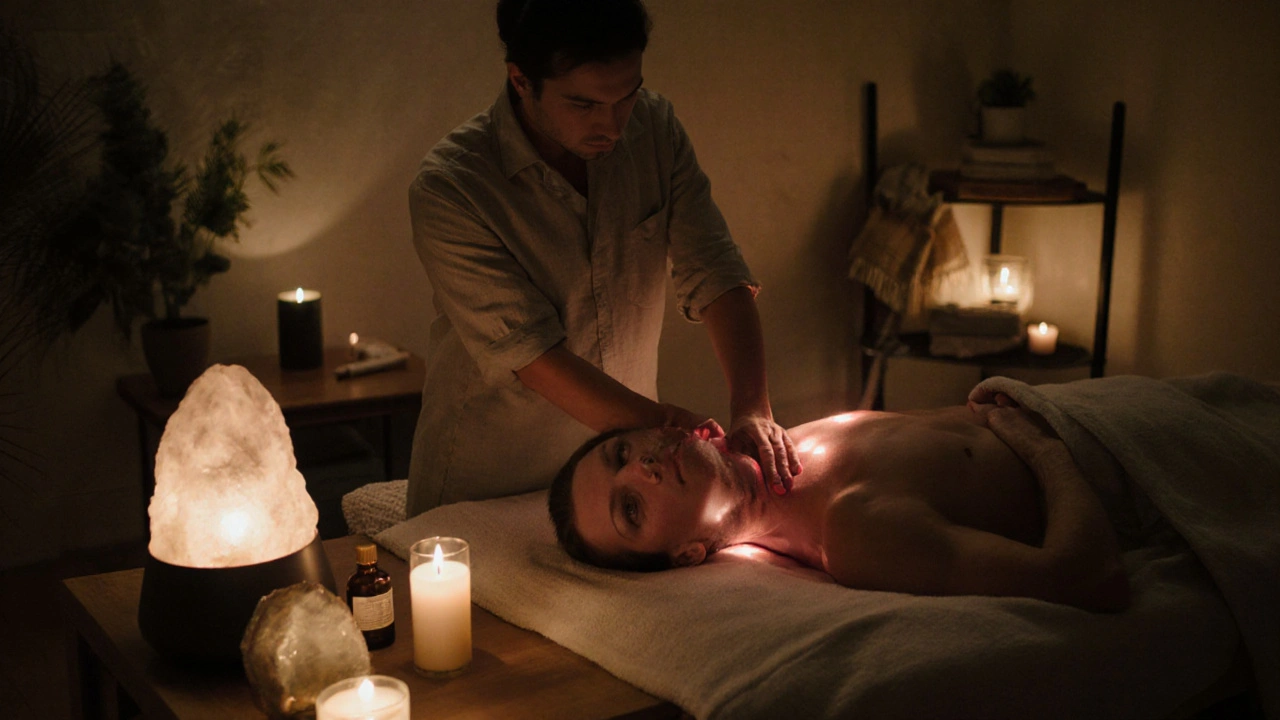
How to Find a Reputable Prostate Massage Service in London
Not every “massage therapist” knows how to do this safely. Here’s how to spot the real deal:
- Check credentials - Look for therapists registered with the Chartered Society of Physiotherapy or British Association for Sexual Health and HIV.
- Ask about training - A qualified practitioner will have completed specific training in pelvic floor anatomy and prostate massage techniques. Don’t settle for “I learned it online.”
- Read reviews - Focus on reviews mentioning hygiene, professionalism, and results-not just “it felt good.”
- Location matters - Top providers operate in central areas: Mayfair, Chelsea, Camden, and Southwark. Avoid pop-up services in unregulated spaces.
Many clinics offer a free 15-minute consultation. Use it. Ask: “What’s your protocol for infection control?” and “Can you explain how you’ll work with my pelvic floor?” If they hesitate, walk away.
What to Expect During Your First Session
First-time clients often worry about discomfort or embarrassment. Here’s what actually happens:
- You’ll be asked to fill out a brief health questionnaire-no judgment, just safety.
- You’ll undress privately and lie on a comfortable table. A drape covers you at all times.
- The therapist will explain each step before doing it. You control the pace.
- Internal massage uses a gloved, lubricated finger. External massage uses gentle pressure on the perineum (the area between scrotum and anus).
- It’s not painful. Most describe it as deep pressure, sometimes tingling. Some feel a release-like tension melting.
- Afterward, you might feel slightly tired or relaxed. Drink water. Avoid strenuous activity for a few hours.
It’s not a quick fix. Most people need 3-6 sessions to notice real change. But the first one? It’s often the most eye-opening.
Pricing and Booking in London
Prices vary based on experience and setting:
- Clinical/Therapeutic: £80-£120 per session (often covered by private health insurance if referred by a GP).
- Wellness: £90-£150 per session. May include 60-90 minutes with added therapies.
- Intimate/Sensual: £150-£250 per session. Higher due to specialized training and extended time.
Many clinics offer package deals-three sessions for £220, for example. Booking is usually done online or by phone. No walk-ins. Expect to pay a deposit to secure your slot.
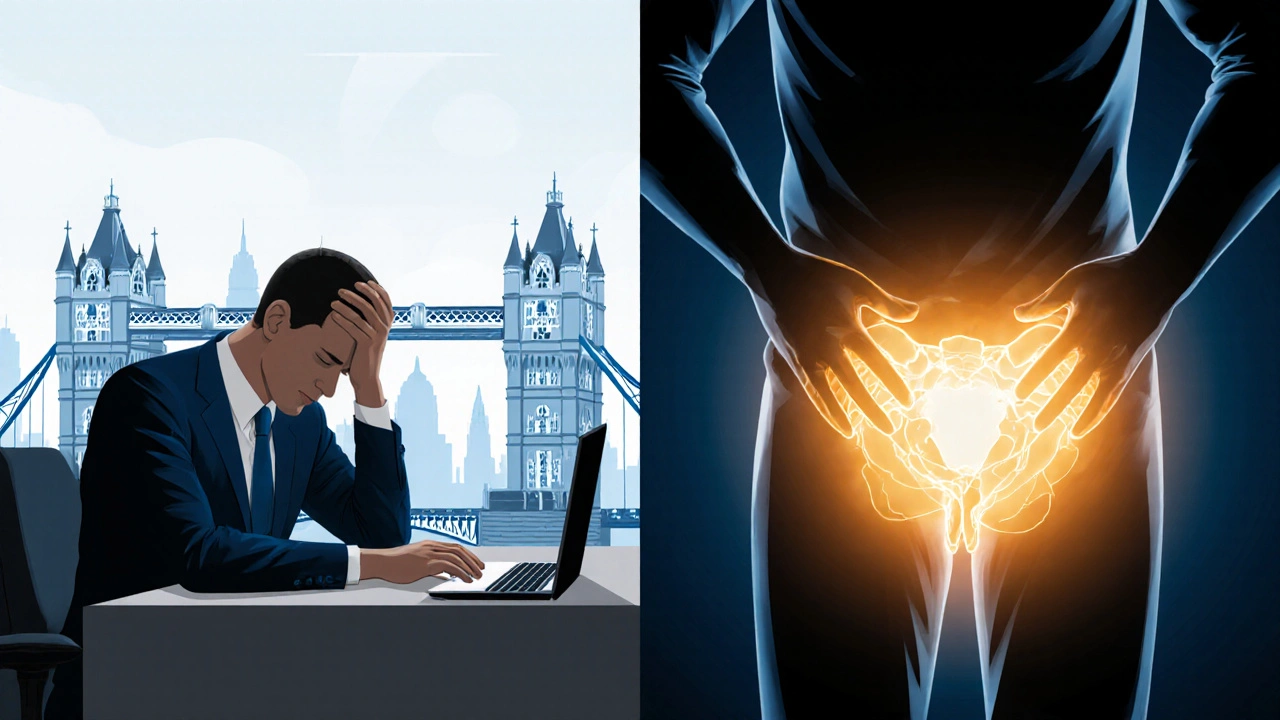
Safety First: What You Must Know
This isn’t something to try at home with a YouTube tutorial. Here’s what keeps it safe:
- Hygiene - Gloves, single-use lube, and clean linens are non-negotiable.
- Contraindications - Don’t do this if you have an active infection, recent surgery, hemorrhoids, or prostate cancer (unless cleared by your oncologist).
- Communication - Say “stop” at any time. A good practitioner will pause immediately.
- Aftercare - Urinate after the session. It flushes out any released fluids and reduces risk of irritation.
There’s no evidence that professional prostate massage causes harm when done correctly. The risks come from untrained providers or DIY attempts.
Prostate Massage vs. Other Male Wellness Treatments in London
| Method | Focus | Effectiveness for Pelvic Pain | Session Cost | Training Required |
|---|---|---|---|---|
| Prostate Massage | Direct prostate and pelvic floor release | High | £80-£250 | Specialized clinical or therapeutic training |
| Acupuncture | Energy flow, nerve modulation | Moderate | £60-£100 | Registered acupuncturist |
| Pelvic Floor Physio | Muscle retraining, exercises | High | £90-£140 | Chartered physiotherapist |
| Medication (alpha-blockers) | Symptom suppression | Moderate | £10-£30/month | Prescription only |
| Self-massage (DIY) | Attempted relief | Low to risky | Free | None-high risk of injury |
Prostate massage stands out because it targets the root cause-not just the symptoms. It’s not a quick pill. It’s a hands-on reset.
Frequently Asked Questions
Is prostate massage only for gay men?
No. Prostate massage is for any man with a prostate-regardless of sexual orientation. It’s a medical and wellness procedure, not a sexual service. Most clients in London are heterosexual, married, or in long-term relationships. The focus is on health, not pleasure.
Does it hurt?
It shouldn’t. You might feel pressure or a strange sensation, especially if you’re tense. A skilled practitioner will go slow and adjust based on your feedback. If it hurts, speak up. Pain means something’s wrong.
Can I do this myself at home?
Technically, yes-but it’s not recommended. Without proper training, you risk injury, infection, or pushing inflammation deeper. Professionals use sterile tools, know anatomy, and can identify red flags. DIY is like trying to fix your own spine with a rubber mallet.
How many sessions do I need?
Most men see improvement after 3-5 sessions. For chronic issues, a monthly maintenance session helps. Think of it like going to the gym-you don’t stop after one workout. Consistency matters.
Is this covered by the NHS?
Not directly. The NHS doesn’t fund prostate massage as a standard treatment. But if you’re referred by a GP for chronic prostatitis, you might qualify for pelvic floor physiotherapy through the NHS-which often includes similar techniques.
Will I feel embarrassed?
It’s normal to feel nervous the first time. But professionals in London are trained to create a calm, respectful space. You’re not a patient number-you’re a person. Most men leave feeling relieved, not embarrassed.
Ready to Take the Next Step?
If you’ve been ignoring pelvic discomfort, waiting for it to go away, or just assumed it’s “part of getting older”-it’s time to rethink that. Prostate massage isn’t taboo. It’s practical. It’s effective. And in London, you have access to some of the most skilled practitioners in Europe.
You don’t need to be desperate to try it. You just need to be ready to care for your body like you care for your car, your job, or your health insurance. Your prostate works for you every day. Maybe it’s time to return the favor.
Start with a consultation. Ask questions. Trust your gut. And if you’re still unsure? Book one session. See how you feel after. You might be surprised what a little pressure can release-not just physically, but mentally too.
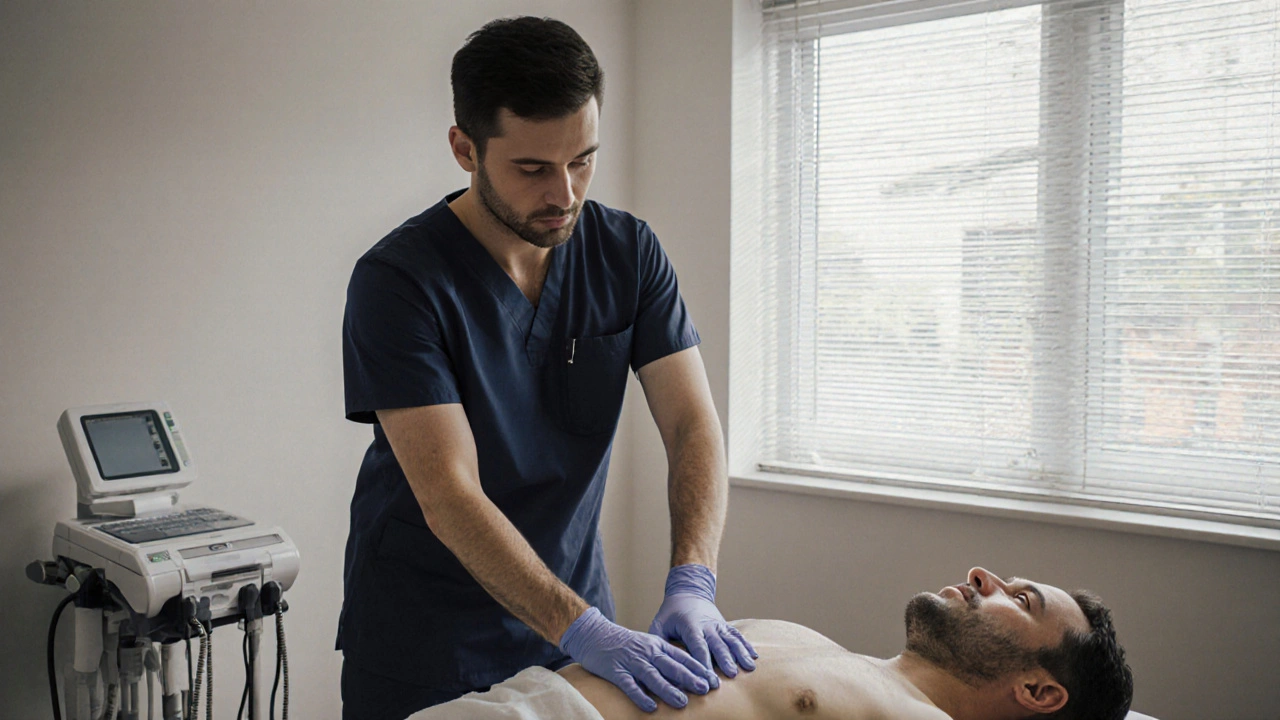

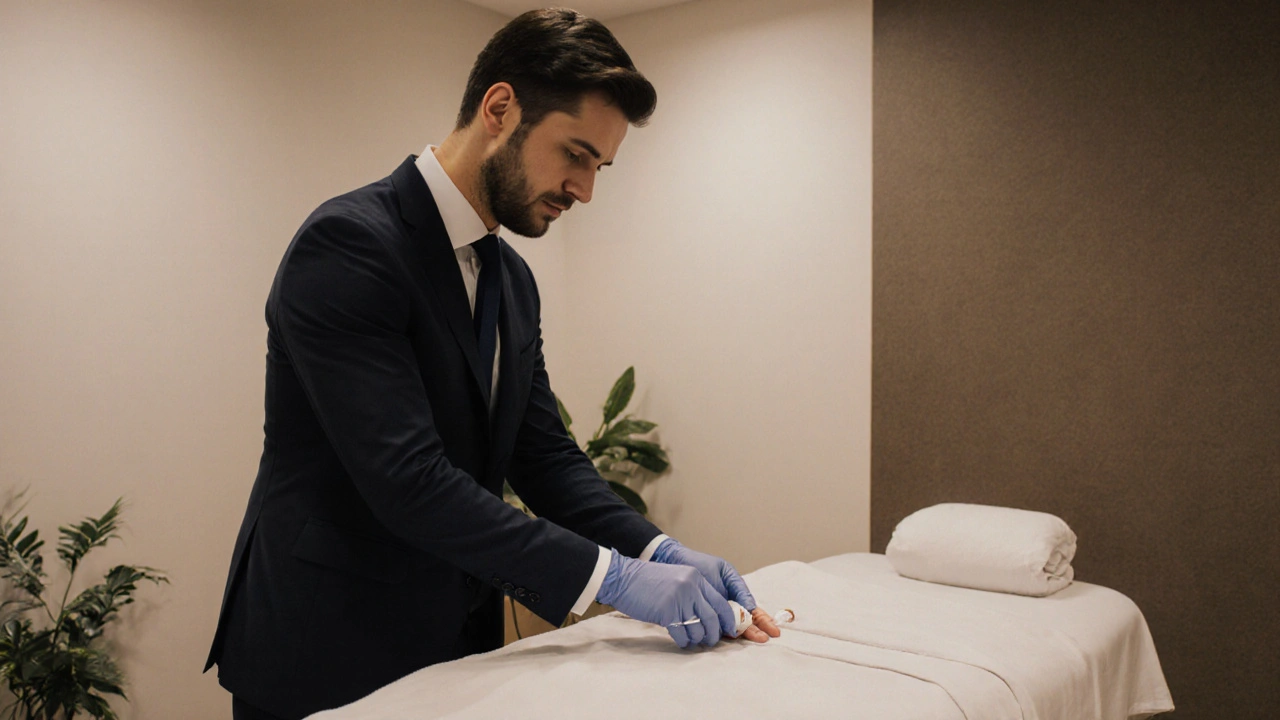
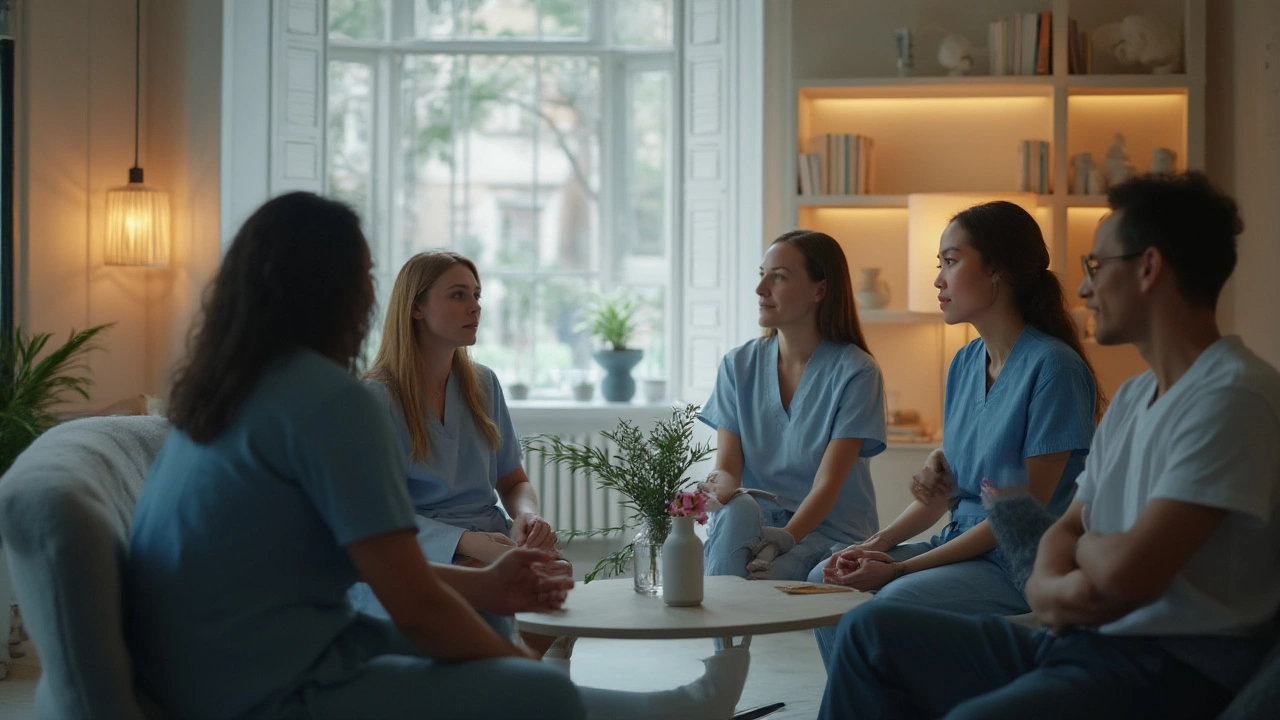
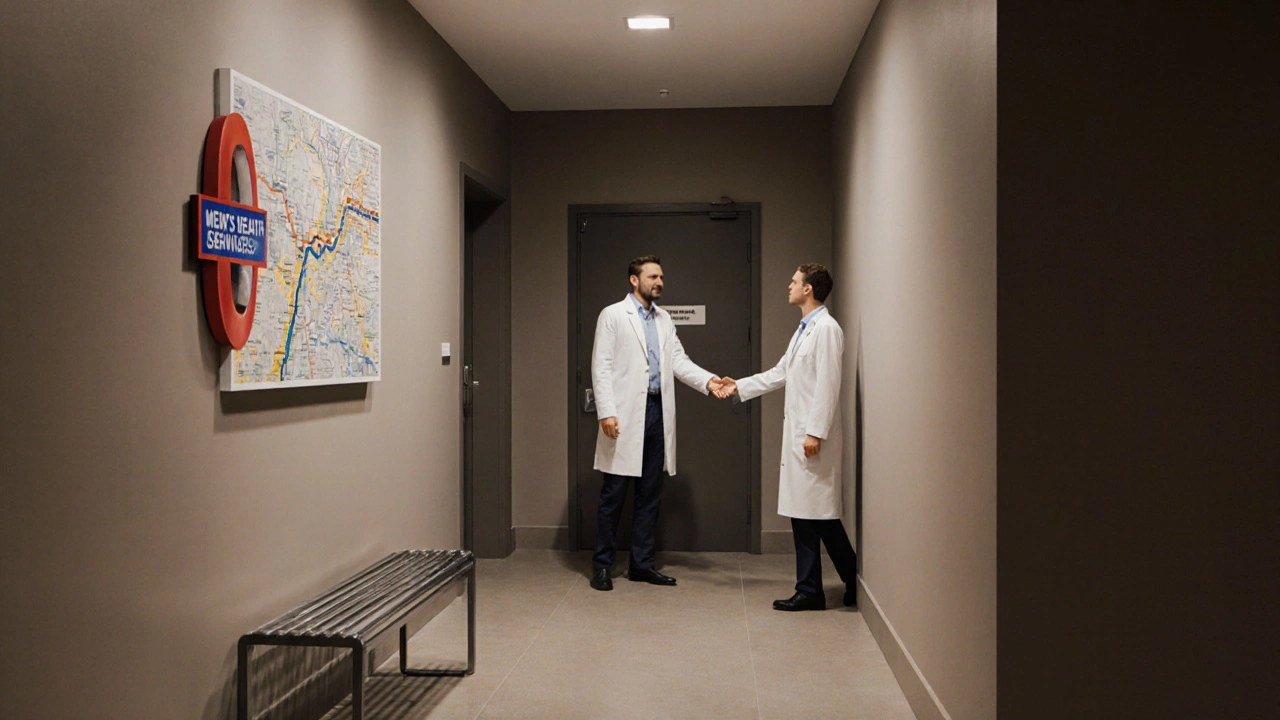
Amy Black
November 18, 2025 AT 01:38Prostate massage isn't something I ever thought I'd read about seriously, but the clinical data here is compelling. I work with a urologist who mentioned pelvic floor therapy last year, and this aligns perfectly with what she described. The emphasis on hygiene and practitioner credentials is exactly what makes this different from sketchy online advice. London has some of the best integrative health providers in Europe - if you're considering it, do your homework and go through a certified clinic.
Antony Silson
November 19, 2025 AT 01:21Let’s be real - this reads like an ad disguised as medical advice. 42% of men have pelvic discomfort? So what? That doesn’t mean massage is the answer. Most of these ‘benefits’ are anecdotal. The study cited? No link. No DOI. No methodology. And now we’re comparing it to acupuncture like they’re equivalent therapies? Please. If this were legitimate medicine, the NHS would fund it. It’s not. It’s wellness theater for men who want to feel like they’re doing something radical while paying £200 for a finger job.
Elle Daphne
November 20, 2025 AT 07:33Okay I’m crying a little because this is the kind of content we NEED more of!! So many men suffer in silence thinking it’s just ‘getting older’ - but it’s not normal to wake up 3x a night to pee!! This isn’t weird, it’s WISE. And the breakdown of clinical vs wellness vs sensual? Perfect. No shame, no judgment, just clear options. If you’re even slightly curious - book the consultation. You have nothing to lose and everything to gain. Your body will thank you. Seriously. Just do it. 🙌
Nick LoBrutto
November 21, 2025 AT 21:13Antony’s comment is harsh but not entirely wrong - there’s a lack of citations here. But Amy’s right too. I’ve seen pelvic floor physio help guys with chronic prostatitis, and prostate massage is often part of that. The key is distinguishing between licensed professionals and the sketchy ‘soul healer’ types on Instagram. I’d love to see a follow-up with actual study links. Also, is there data on long-term outcomes? Like, does this reduce the need for meds over time?
Kelley Moody
November 23, 2025 AT 10:40Just wanted to add - if you’re in the UK and can’t afford private care, ask your GP for a referral to a pelvic health physio. Many NHS trusts now offer this under ‘chronic pelvic pain pathways,’ especially in London. It’s not called ‘prostate massage’ on the forms, but the techniques are identical. I had a friend who got it through the NHS after 8 months of waiting - and it changed his life. Don’t assume it’s only for the wealthy.
Rick Vaughn
November 25, 2025 AT 08:25Prostate massage is a pseudoscientific scam. The prostate is not a muscle. It cannot be ‘massaged’ like a shoulder. The idea that it improves erections is biologically implausible. Men who report benefits are experiencing placebo effects or temporary nerve stimulation. This article is dangerous. It normalizes medical quackery under the guise of wellness. Stop promoting this.
La'Sherrell Robins
November 26, 2025 AT 13:36ok but like… imagine your prostate is a little stressed-out dude who’s been sitting at a desk for 12 hours straight, wearing tight jeans, and drinking 7 energy drinks. now imagine someone finally gives him a backrub. he’s gonna sigh, maybe even cry a little. that’s what this is. not a sex thing. not a gay thing. just… a human thing. also i went to this place in camden and the therapist had a cat named ‘Prostie’ and i cried. not because it hurt. because i finally felt heard. also i’m telling my dad about this. he’s 62 and thinks he’s ‘fine.’ he’s not. he’s just numb. send help. and maybe a coupon code.